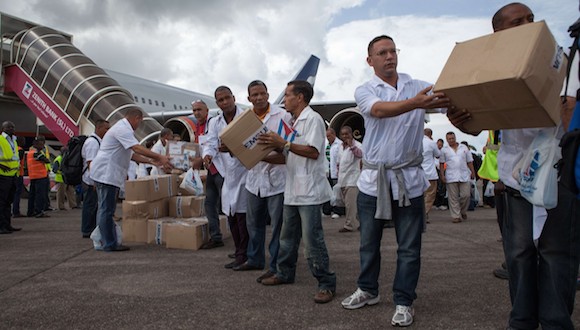 HAVANA, Cuba, Oct 6 (acn) The newspaper The Washington Post has recently published an article on Cuba's medical response to the outbreak of the Ebola fever virus in Africa, entitled "In the medical response to Ebola, Cuba is punching far above its weight." Up next we bring you excerpts of that publication.
HAVANA, Cuba, Oct 6 (acn) The newspaper The Washington Post has recently published an article on Cuba's medical response to the outbreak of the Ebola fever virus in Africa, entitled "In the medical response to Ebola, Cuba is punching far above its weight." Up next we bring you excerpts of that publication.
The article comments that "While the international community has been accused of dragging its feet on the Ebola crisis, Cuba, a country of just 11 million people that still enjoys a fraught relationship with the United States, has emerged as a crucial provider of medical expertise in the West African nations hit by Ebola," the Cubadebate Web site reported on Saturday.
On Thursday, points out the text, 165 health professionals from the country arrived in Freetown, Sierra Leone, to join the fight against Ebola – the largest medical team of any single foreign nation, according to the World Health Organization (WHO). And after being trained to deal with Ebola, a further 296 Cuban doctors and nurses will go to Liberia and Guinea, the other two countries worst hit by the crisis, adds the article published by The Washington Post.
And the text continues: "Cuba's universal health-care system enables such an export. The country nationalized its health care shortly after its revolution, ending private health care and guaranteeing free health care in its constitution. The results have been widely praised. In 2008, evaluating 30 years of Cuba's "primary health care revolution," the Bulletin of the World Health Organization pointed to impressive strides that the country had made in certain health indicators. ´These indicators – which are close or equal to those in developed countries – speak for themselves, ´ Gail Reed noted, pointing to a huge reduction in number of deaths for children under five years old and Cuba's high life expectancy of 77 years."
"Cuba's health-care success is built upon its medical training. After the Cuban revolution, half of the country's 6,000 doctors fled and the country was forced to rebuild its work force. The training system grew so much that by 2008, it was training 20,000 foreigners a year to be doctors, nurses and dentists, largely free of charge."
"Ebola isn't the first time that Cuban health workers have been sent to deal with a global disaster. Even back in 1960, immediately after the revolution, Cuba sent doctors to Chile to help in the aftermath of a devastating earthquake, and the practice has continued for decades since. In 2005, Cuba even offered to send medical workers to the United States after Hurricane Katrina in 2005 (they were apparently rebuffed)."
"Reuters reports that Cuba currently has around 50,000 health workers working in 66 countries...The number of Cuban medical staff in Sierra Leone, Liberia and Guinea looks set to be more than those sent from far-larger countries."
"Money and materials are important, but those two things alone cannot stop Ebola virus transmission," Dr Margaret Chan, director-general at the World Health Organization, said last month. "Human resources are clearly our most important need."
Adam Taylor writes about foreign affairs for The Washington Post. Originally from London, he studied at the University of Manchester and Columbia University.










Nos reservamos el derecho de no publicar los comentario que incumplan con las normas de este sitio